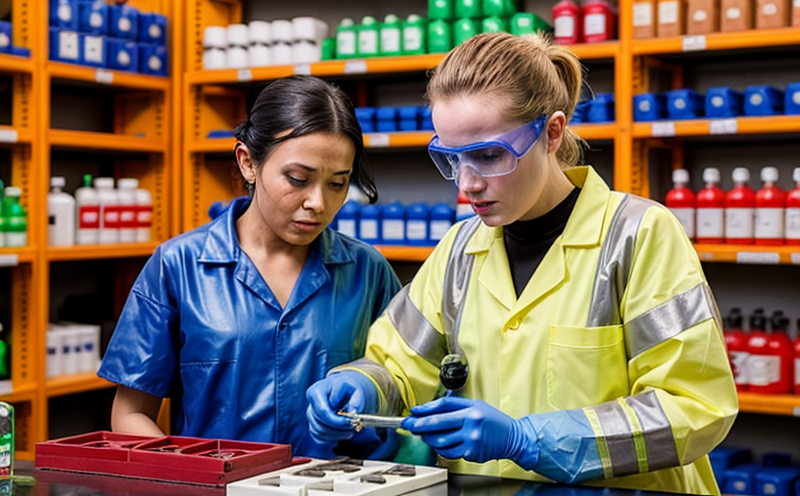EN 71-3 Migration of Hazardous Elements Testing in Trade Products
The European Standard EN 71-3 is a crucial document that sets out specific requirements for the safety and quality control of toys and other products intended for children. This standard aims to ensure that all materials used are safe, especially when they come into contact with skin or oral consumption by children. One critical aspect covered under this standard relates to the migration of hazardous elements from trade products.
The migration of hazardous elements can lead to potentially harmful effects on human health, particularly for young individuals who have a higher likelihood of exposure due to their behavior and environment. This testing ensures that any product sold in Europe adheres strictly to stringent safety standards, protecting consumers against unnecessary risks.
Under EN 71-3, certain elements such as lead (Pb), cadmium (Cd), mercury (Hg), and others are classified into categories based on their potential toxicity. These elements can be present in various forms within products like paint, varnish, or even in the composition of plastics used for manufacturing toys. The standard specifies detailed methods to determine whether these hazardous substances exceed acceptable limits.
The testing process involves several steps which include sample preparation, extraction using appropriate solvents, and subsequent analysis by instrumental techniques such as Inductively Coupled Plasma Mass Spectrometry (ICP-MS). Depending on the type of product being tested, different extraction procedures may apply; for instance, surface cleaning followed by soaking in dilute acids or organic solvents.
It is essential to note that compliance with EN 71-3 extends beyond just meeting regulatory requirements. It also enhances brand reputation and consumer trust by demonstrating a commitment to product safety and quality assurance. Non-compliance can result in severe consequences, including legal actions, fines, recalls, and damage to business relationships.
Moreover, this testing plays an integral role in ensuring that manufacturers maintain consistency across their production lines. By regularly performing these tests, companies can identify any variations early on and address them promptly before they escalate into larger issues affecting the entire supply chain.
- Ensures Product Safety: By verifying that no hazardous elements exceed specified limits, it provides peace of mind to both producers and consumers alike.
- Promotes Compliance: Helps businesses stay ahead of regulatory changes by providing clear guidance on acceptable levels of harmful materials.
- Enhances Reputation: Demonstrates a strong dedication to maintaining high standards of quality and safety, thereby building customer loyalty.
In conclusion, EN 71-3 migration testing is not merely a compliance exercise but rather an investment in safeguarding public health while fostering trust between manufacturers and their clients. Its importance cannot be overstated given its direct impact on both individual well-being and overall market confidence.
Why Choose This Test
- Comprehensive Compliance: Ensures strict adherence to international standards such as EN 71-3, which are recognized globally for their stringent requirements on product safety.
- Enhanced Reputation: By ensuring that your products meet these rigorous criteria, you build a positive image among consumers and industry peers alike.
- Minimized Risks: Reduces the likelihood of recalls or legal actions resulting from non-compliance with regulations.
- Informed Decisions: Provides valuable insights into product performance through detailed analytical results, helping you make informed decisions about future developments.
Choose our service for EN 71-3 migration testing to ensure that your products not only meet but exceed industry expectations regarding safety and quality.
Quality and Reliability Assurance
The accuracy and reliability of test results are paramount in ensuring compliance with EN 71-3. Our laboratory adheres strictly to international standards, including ISO/IEC 17025, which guarantees the quality of our services. This accreditation ensures that all tests conducted follow established protocols designed to minimize errors and ensure consistent outcomes.
Our team comprises highly qualified professionals with extensive experience in chemical analysis and material science. They employ state-of-the-art equipment such as ICP-MS for precise quantification of trace elements, ensuring that even minute amounts of hazardous substances are detectable. This level of precision is critical when dealing with regulatory limits that can be extremely low.
In addition to technical expertise, we also emphasize customer service and communication throughout the testing process. From initial consultation regarding sample preparation techniques to final reports detailing findings, every step is communicated clearly and transparently. Our goal is to provide comprehensive support so that clients understand exactly what was tested, how it was done, and why specific actions might be necessary based on results.
By choosing our EN 71-3 migration testing service, you can rest assured knowing that your products will be evaluated by experts who possess the knowledge and tools needed to deliver accurate results consistently. This commitment to excellence contributes significantly towards maintaining a safe environment for all users of trade products.
Customer Impact and Satisfaction
The impact of our EN 71-3 migration testing service extends far beyond mere compliance; it directly influences customer satisfaction and trust in your brand. When customers see that their chosen products have undergone rigorous safety checks, they feel more secure about making purchases from you. This increased confidence translates into higher sales volumes and repeat business.
Moreover, by ensuring that your offerings comply with the latest regulations, you demonstrate a proactive approach to protecting public health. Such actions resonate positively within communities where safety and well-being are priorities. As a result, consumers may be more inclined to recommend your brand to friends and family members, further expanding your reach.
From a business perspective, maintaining consistent compliance reduces the risk of costly mistakes such as product recalls or legal disputes arising from non-conformance with standards. These incidents can tarnish reputations irreparably if not handled promptly and effectively. By avoiding such pitfalls through regular testing, you safeguard both short-term profits and long-term growth prospects.
Ultimately, our EN 71-3 migration testing service plays a vital role in fostering trust between manufacturers and their customers, ultimately leading to greater customer satisfaction and loyalty. In today’s competitive market environment, these factors are increasingly important for sustaining successful enterprises.





